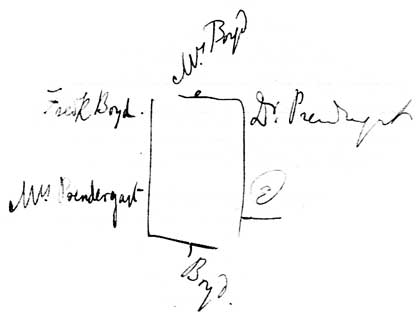Gray ― & damp ― & at times a few light showers ― but warm & pleasant[,] a “nice summer day” ― ‘ς τὴν Ἀγγλίαν.[1]
Drew ― uncertainly ― the smaller 30 tyrants Pisa &c. They are ˇ[an] odd sort of drawings ― inasmuch as they recall vividly other places & times ― yet [have] no “upward aspirations” as vorx of hart. Possibly they may be all unsold: nevertheless ― there 60 must be done ― even if they be unsold. ―
At 3.30. walked to One gun battery ― to make the annual=traditional sketch. Saw heaps of people ―― tht road is a bore always ― διὰ τουτο.[2] Also the ἐξοχότατος[3] who stopped & was amiable ― πρέπει νὰ ὁμολογήσῃ[4] ― his manner is always delightful. He (royally ―) asked after Lushington, & said Mrs. F.’s father “had often boxed his cars” ― & her mother was “an extraordinarily beautiful woman.” I wish he knew I had had to ask C.F. about F.L.’s paper in the Times.
Met Mr. Baillie ― the extinct Duke ― who returned with me ― a pleasant & nice gentlemanly man, & warranting our name ― “the extinct Duke.” ――― Called on Mrs Lyell ― & the Cravens: the poor little boy ― ill & sad & cross ― yet hearing me ―put out his little hand & made friends. Home by 5.35.
Στεφανίζος ―― our comedy progresses.
At 7.15. dinner.
G. has buried the little boy today: & he is calmer now ― not as awful cross.
Poor people! it is a sad close of the year for them. Penned out; the last of all the 30 drawings ― made at Παλαιοκαστριτζα in the spring ― so for once ― we have our drawings penned out in the year they were made. ―
And now ― I go to bed. (G. has been sawing the new lot of wood ― at intervals, to save a professional sawyer ― cost 8/.)
“The year is going: let him go.”
Yet, though I do think this 1862 has been better then 1861 ― I wish 1863 may be far better.
XX8
Ἀς δοκιμάσωμεν ὃτι ἦναι καλήτερον έρχόμενος.[5]
[1] In England (NB).
[2] Because of it (NB).
[3] Eminence (NB).
[4] Must admit (NB).
[5] Let’s think it’s a good thing that he [the new year] comes (NB).
[Transcribed by Marco Graziosi from Houghton Library, Harvard University, MS Eng. 797.3. Image.]



